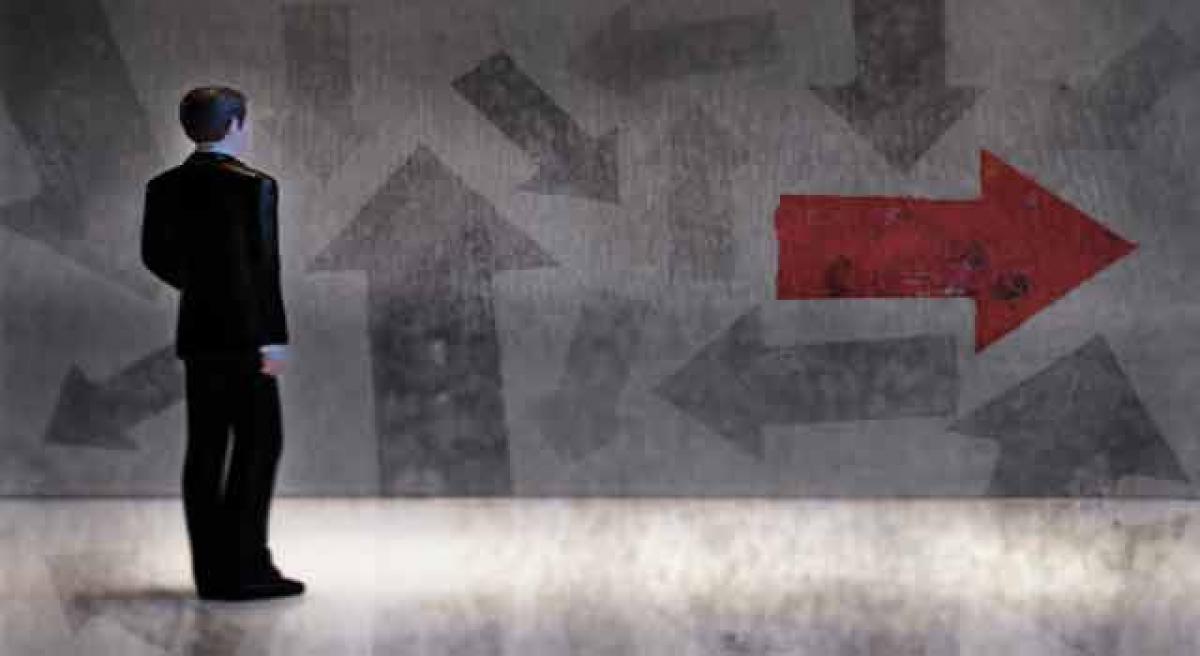Live
- Job mela at Masab Tank tomorrow
- New toilets facilitated for MPP school students
- Steps to safeguard natural springs gain momentum
- RWAs want officials to clear fog over SCB-GHMC merger
- Tanks, canals remain neglected despite execution of MGNREGS works
- BRS to celebrate Deeksha Diwas on Nov 29, Dec 9
- NCC Day grandly celebrated at SITAM
- CITU demands rollback of strategic sale of VSP
- 7-Year-old girl sexually assaulted in Tirupati
- PM Modi highlights govt's efforts to make Odisha prosperous and one of the fastest-growing states
Just In

An introspection of our life provides us with innumerable illustrations of how good and bad decisions impacted us. I am sure certain decisions change our life forever. Thus, a decision in a defining moment determines our journey. Right decisions taken at the right time leads one to the right path.
An introspection of our life provides us with innumerable illustrations of how good and bad decisions impacted us. I am sure certain decisions change our life forever. Thus, a decision in a defining moment determines our journey. Right decisions taken at the right time leads one to the right path.
A defining moment, that one moment, that defines something, such as a person's success, failure, achievement, decline, talent going astray or turning useful. It is a point at which the essential nature or character of a person or an entity stands out as an ever-lasting identity.
This principle applies to an individual, institution, enterprise or a nation. In 1991, the then Union Finance Minister Dr Manmohan Singh decided to liberalise Indian economy. Consequently, Indian economic history is categorised as pre-1991 and post-1991 periods. But, 1991 remains the watershed year. One can either agree or disagree with Manmohanomics, but none can ignore it.
Why do people hesitate to take decisions?
Subash Chandra in his book ‘The Z Factor’ observes, “We Indians tend to be docile. We prefer to be led and not to be leaders.”
Rather than aspiring to stand in a queue, one should develop the feeling of ‘let the queue begin with me’. Refuse to accept a situation. Resolve to fight the circumstances.
Subash Chandra has proved that he is an exception to the rule. And he succeeded! He, by establishing a private news broadcasting channel when it was not officially allowed in the country has set the ball rolling. Today, you cannot imagine India without so many private channels.
Many refrain from attempting to take decisions because of several inhibitions. Some of them may be even genuine. But, indecisiveness will lead you nowhere.
If you are at the crossroads and undecided on which route to take, chances are high that you will either meet with an accident or be the reason for it.
APJ Abdul Kalam has rightly observed, “To me, the level of responsibility is measured by one's ability to confront the decision-making process, devoid of any procrastination or distraction.”
Remember always that qualitative results are achieved when you are relaxed and free of doubt. Several psychologists have also studied the attributes of decision making as a character of human behaviour.
While taking decisions, one should be conscious of its consequences. Evaluate the cost benefits of the decision. Psychologists tell us to differentiate between a wrong decision and a mistake. Quite often people get confused with the two.
A decision is intentional while a mistake is incidental and unintended. Writing on the psychology of bad decision making in an article entitled ‘How to stop choosing the wrong thing’ psychotherapist Divya Srivastava said, “The first step towards stopping the process of making decisions that are not good for us, is to stop terming the ‘bad decision’ as a ‘mistake’.
When we re-classify a bad decision as a mistake, we are giving ourselves the opportunity to go easy. Mistakes happen — they aren’t anybody’s fault. Dismissing the bad decisions we take as mistakes stop us from becoming responsible for our actions. We are able to live with ourselves free of guilt, and we don’t accept the blame. Inevitably, we are programming ourselves to keep making the same bad decision again and again.”
The lure for immediate rewards deprives us of long-term benefits that come from good and timely decisions. Don’t live in the moment. People take wrong decisions when the probability of punishment is not so serious. Decisions should never be driven by impulses. Hence, the adage, ‘if you are failing to plan, you are planning to fail.’
Some have a habit of taking decisions, including ambitious ones, but they do precious little to put them into action. This destroys the very sanctity of decision-making. They are like New Year resolutions or electoral promises, neither of which is seriously pursued.
The decision is only a beginning of an action rather than its end. Stay committed to your decisions, but be flexible in your approach, cautions Tony Robbins, an American motivational speaker.
Consciousness of future will help to take decisions. But, follow them up. A Stanford study showed that those who saw a photo of their future self and acted upon them made smarter financial decisions.
High achievers spot rich opportunities swiftly, make big decisions quickly and spring into action immediately. A healthy assessment of your strengths and weaknesses is vital for taking a right decision. Unfortunately, decisions are often taken under peer pressure or competitive aspirations. Aspire to achieve. But you need to perspire too.
As Kalidasa said, yesterday is a dream. Tomorrow is a hope. If you do your duty rightly now, every yesterday will be a dream of happiness and every tomorrow will be a vision of hope. Rather than being a face in the crowd, remember that hope springs eternal. Go for that defining moment and reap the benefits.

© 2024 Hyderabad Media House Limited/The Hans India. All rights reserved. Powered by hocalwire.com







